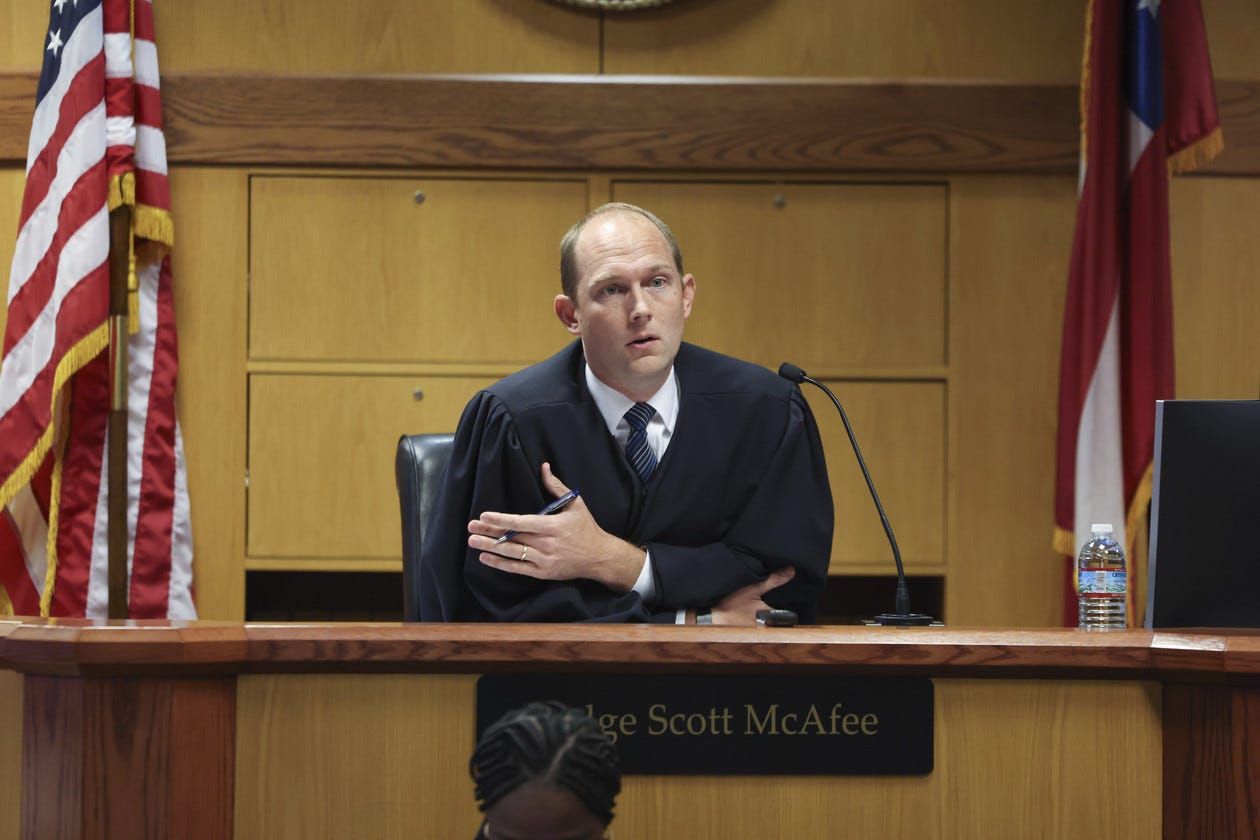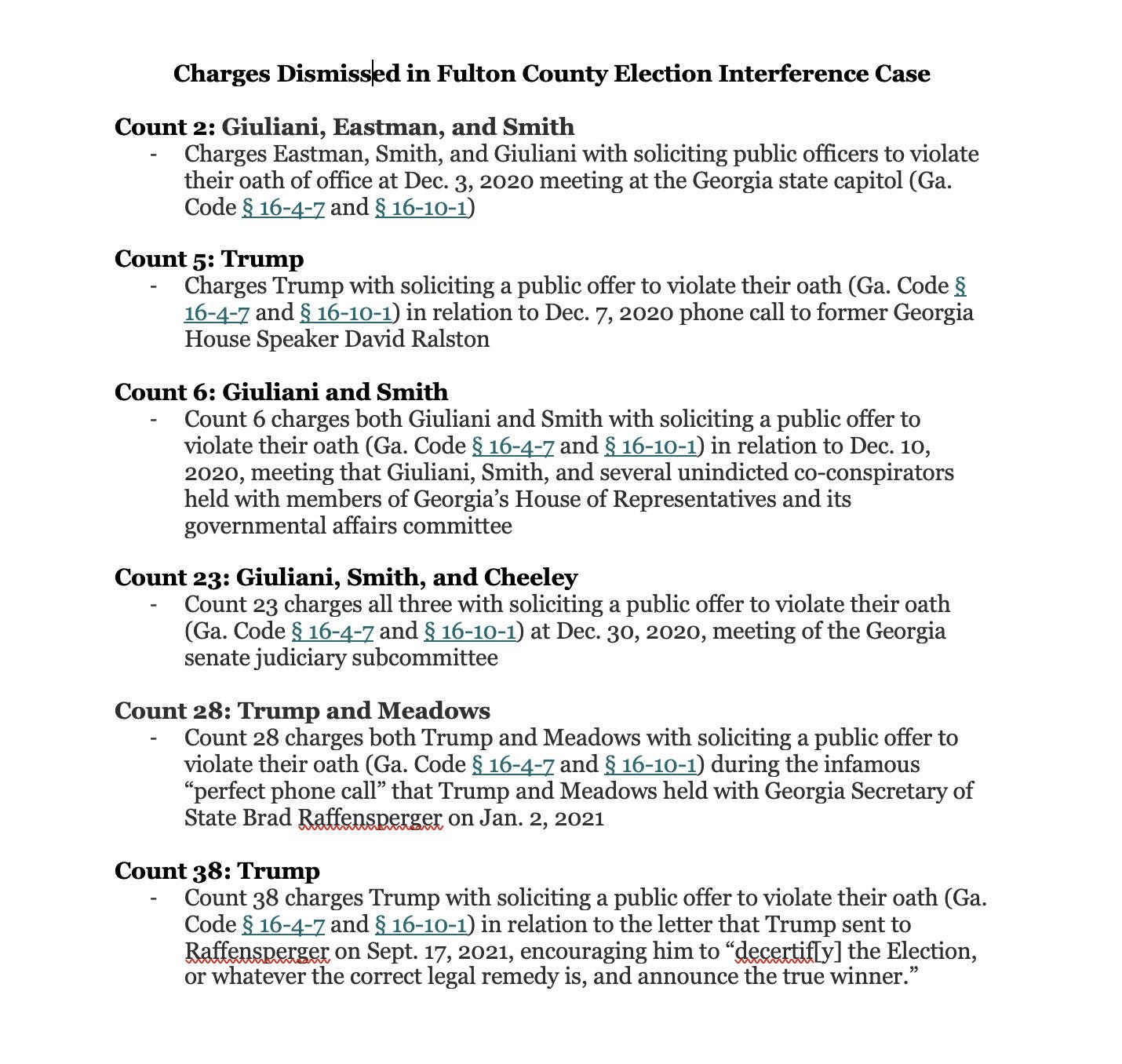Wednesday
This week has been a decade of legal news so far, and it’s only Wednesday. It’s not likely to slow down as the week comes to an end, either. So tonight, we take up two developments from today.
Some counts, but not RICO, dismissed in the Fulton County case
Late last year Judge McAfee heard oral argument on a series of motions to dismiss. Today, he dismissed six of the charges in Fani Willis’ indictment, but importantly, not the centerpiece RICO charge. The Judge wrote that the charges "contain all the essential elements of the crimes but fail to allege sufficient detail regarding the nature of their commission." The technical vehicle for the dismissal is called a “special demurrer” under Georgia law; it’s a challenge to an indictment that says, in essence, that it doesn’t provide enough information for a defendant to be able to adequately defend himself.
The charges the Judge dismissed, counts 2, 5, 6, 23, 28, and 38, charge various defendants with soliciting a public officer to violate their oath of office. Georgia law says the indictment has to be specific about that violation, and the Judge ruled that the indictment isn’t. That seems like a fair ruling here because the indictment charges that the conduct violated the U.S. and Georgia Constitutions, and the Judge points out that is “so generic as to compel this Court to grant the special demurrers. On its own, the United States Constitution contains hundreds of clauses, any one of which can be the subject of a lifetime’s study. Academics and litigators devote their entire careers to the specialization of a single amendment.”
This isn’t a bad ruling from the Judge. The bad ruling would be if there were convictions in the case that were reversed on appeal because of a flaw in the indictment. The judge is a former federal prosecutor and may have applied this rule more strictly than what is usual in state cases, but the principle is a sound one—when charges do not contain sufficient facts to put defendants on notice, they are due to be dismissed.
In a footnote, Judge McAfee explicitly gave Willis the opportunity to appeal him or correct the error by going back to the grand jury. As a practical matter, Georgia’s RICO statute is broad and Willis can make arguments about these same matters as part of that charge, so there is no need for her to subject the case to the delay that would be involved in rectifying this matter. In the ultimate scheme of things, this is not a big deal, and I don’t read anything into it one way or another about the Judge’s inclinations in the Willis disqualification matter. It seems more likely to me that he’s cleaning up his docket before the April 1 start of spring break in Fulton County.
Anna Bower posted this great breakdown of the dismissed charges on Twitter if you want to see the details:
Trump files his reply briefs in Mar-a-Lago on his motions to dismiss ahead of tomorrow’s hearing
Tomorrow, Judge Cannon will hear from the lawyers on Trump’s motions to dismiss the entire prosecution based on the Presidential Records Act (PRA) and “unconstitutional vagueness.” Trump filed his reply briefs for both motions today. In motions practice, the party making the motion, which is Trump here, files the motion. The other side files a response and then the movant is permitted to file a reply. Trump’s reply brief on the PRA is here and the vagueness brief is here.
Trump is still insisting that because he designated the documents at issue in Counts 1–32 as personal records under the PRA, his possession of them was authorized and he can’t be prosecuted for it. We noted Sunday night that even if this argument is correct—and it’s not—it only knocks out the counts under 18 U.S.C. 793(e), which prohibits unauthorized possession and willful retention of National Defense Information, and has no impact on the obstruction charges Trump faces. Trump is also arguing that when the National Archives tried to get documents back from Trump, the requests were illegal because they were “politically motivated and driven by the Biden Administration as a political weapon against President Trump.” They make an effort here to knock out the obstruction charges, asserting that since there weren’t “reasonable grounds to believe” Trump had violated the law, “the non-Espionage Act charges must be dismissed as well.”
If this was any other judge, I’d be telling you there was a 105% chance these motions would be dismissed. But with Judge Cannon, we just have to wait and see how she’ll rule. Designating records as presidential, even if Trump actually did that, which is in doubt, is not a mechanism for getting around criminal laws regarding wrongful possession of classified information. And Trump’s allegation that the prosecution is a political plot flies in the face of the way DOJ restored the separation it has from the White House—a barrier Trump took down—over the conduct of criminal cases. Looming over all of Trump’s arguments is the undeniable fact that when given the opportunity to return these items without any consequences, he doubled down, denying he had them and taking intentional steps to avoid returning them when the government subpoenaed them.
Trump’s argument here, as it so frequently does, depends on his vision of an imperial presidency where the president can do no wrong while in office or even afterward. If Trump’s view of the law is correct, a president could walk out of the White House with the nuclear codes, the identities of highly placed human sources, and all sorts of other sensitive information and share it freely with others without consequence. Common sense suggests that can’t be how the law works.
The unconstitutional vagueness argument is based on a legal doctrine that says that criminal laws have to be clear enough for ordinary people to understand them. Trump claims that Section 793(e) is unconstitutionally vague and that the courts can’t “gloss” or interpret it in a way that saves it.
Unfortunately for Trump, other courts that have considered this statute ruled that it was not unconstitutionally vague. And again, even if there is a problem with Section 793(e), that doesn’t address the obstruction charges against Trump. There’s nothing vague about the idea that you can’t remove items from your storage area before you let your lawyers review papers to decide what must be turned over to the government after your receive a subpoena. Trump’s team again engages in pretzel logic to try and persuade the Judge that Congress had no idea what it was doing when it enacted the law and that by virtue of Trump’s neat trick of designating classified information as his personal records, the law can’t apply to him. They brush aside the fact that Trump received high level briefings on handling classified information—and the consequences of mishandling it, dismissing the law Trump is accused of violating as one that captures “innocuous information of alarming breadth.”
The bigger question here than the validity of Trump’s motions is whether the Judge has decided her reputation can’t take any more hits from her one-sided rulings in Trump’s favor, including the two that the Eleventh Circuit reversed when she tried to prevent the government from using evidence obtained during the search of Mar-a-Lago.
Judge Cannon has shown more than considerable tolerance for Trump’s most specious arguments in the past, requiring the Eleventh Circuit Court of Appeals to not-so-gently step in and correct her decisions. We’ll learn whether she’s had a change of heart when she rules on these motions or whether her thumb remains on the scales of justice in Trump’s favor.
That’s a wrap on Wednesday. Onwards.
We’re in this together,
Joyce





Joyce—If Cannon rules for trump, do you think this will prompt Smith to finally go over her head and appeal?
She has no business being on the bench. A total disgrace.
Thank you Joyce. You know what the sad part is that I know that you have to write it this way, but the bottom line is I know his lawyers are the ones coming up with all the information. I don’t think Trump could think his way out of a McDonald’s bag, though he probably wouldn’t want to, I don’t believe he understands what he does. And that’s the sad and scary part and thank you for pointing it out for all of us to realize what’s really going on. It’s a Shelle game. Take care everybody stay strong, vote blue all down the line.